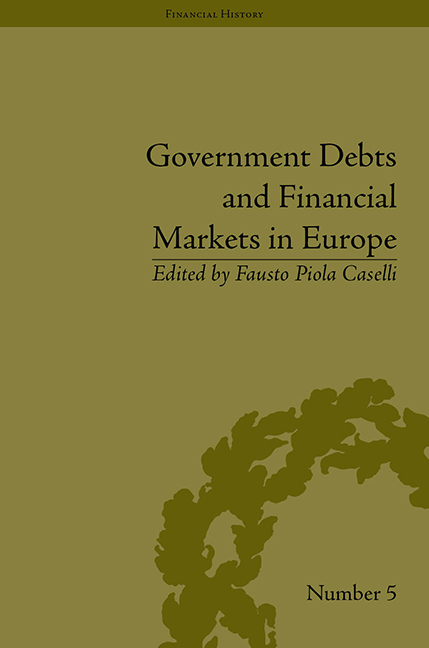Book contents
- Frontmatter
- CONTENTS
- Contributors
- List of Charts and Tables
- Introduction
- 1 The Financial Administration of North Hanseatic Cities in the Late Middle Ages: Development, Organization and Politics
- 2 Government Debts and Credit Markets in Renaissance Italy
- 3 Government Debts and Financial Markets in Castile between the Fifteenth and Sixteenth Centuries
- 4 Government Debt and Financial Markets: Exploring Pro-Cycle Effects in Northern Italy during the Sixteenth and the Seventeenth Centuries
- 5 Government Policies and the Development of Financial Markets: The Case of Madrid in the Seventeenth Century
- 6 The Role Played by Short-Term Credit in the Spanish Monarchy's Finances
- 7 From Subordination to Autonomy: Public Debt Policies and the Creation of a Self-Ruled Financial Market in the Kingdom of Naples in the Long Run (1500–1800)
- 8 Public Debt in the Papal States: Financial Market and Government Strategies in the Long Run (Seventeenth–Nineteenth Centuries)
- 9 Towards a New Public Credit Policy in Eighteenth-Century Spain: the Introduction of the Tesorería Mayor de Guerra (1703–6)
- 10 French Public Finance between 1683 and 1726
- 11 Long-Term War Loans and Market Expectations in England, 1743–50
- 12 Mercantilist Institutions for the Pursuit of Power with Profit: The Management of Britain's National Debt, 1756–1815
- 13 Italian Government Debt Sustainability in the Long Run, 1861–2000
- 14 Times of Wasteful Abundance: The Apogee of the Fiscal State in the Federal Republic of Germany from the 1960s to the 1980s
- Conclusion: Final Remarks
- Notes
- Bibliography
- Index
14 - Times of Wasteful Abundance: The Apogee of the Fiscal State in the Federal Republic of Germany from the 1960s to the 1980s
- Frontmatter
- CONTENTS
- Contributors
- List of Charts and Tables
- Introduction
- 1 The Financial Administration of North Hanseatic Cities in the Late Middle Ages: Development, Organization and Politics
- 2 Government Debts and Credit Markets in Renaissance Italy
- 3 Government Debts and Financial Markets in Castile between the Fifteenth and Sixteenth Centuries
- 4 Government Debt and Financial Markets: Exploring Pro-Cycle Effects in Northern Italy during the Sixteenth and the Seventeenth Centuries
- 5 Government Policies and the Development of Financial Markets: The Case of Madrid in the Seventeenth Century
- 6 The Role Played by Short-Term Credit in the Spanish Monarchy's Finances
- 7 From Subordination to Autonomy: Public Debt Policies and the Creation of a Self-Ruled Financial Market in the Kingdom of Naples in the Long Run (1500–1800)
- 8 Public Debt in the Papal States: Financial Market and Government Strategies in the Long Run (Seventeenth–Nineteenth Centuries)
- 9 Towards a New Public Credit Policy in Eighteenth-Century Spain: the Introduction of the Tesorería Mayor de Guerra (1703–6)
- 10 French Public Finance between 1683 and 1726
- 11 Long-Term War Loans and Market Expectations in England, 1743–50
- 12 Mercantilist Institutions for the Pursuit of Power with Profit: The Management of Britain's National Debt, 1756–1815
- 13 Italian Government Debt Sustainability in the Long Run, 1861–2000
- 14 Times of Wasteful Abundance: The Apogee of the Fiscal State in the Federal Republic of Germany from the 1960s to the 1980s
- Conclusion: Final Remarks
- Notes
- Bibliography
- Index
Summary
‘Germans are getting poorer’ – under this title, the news magazine Der Spiegel published a series of articles in the summer of 1982, shortly before the fall of the social-liberal coalition government. The author, Renate Merklein, took issue with the fiscal policies of the Brandt and Schmidt administrations. According to Merklein, these policies were based on the ‘belief ’ that the state ‘could do and know everything better, that it knew what was best for its citizens – even better than they themselves –, and that it was also capable of getting everything that was wished for, promptly and inexpensively’. The controversial journalist thus reproached a wasting of public funds that she traced back to the 1960s and 1970s. In these two decades, it had often been debated whether there should be ‘more state’ or not; at the same time, public expenditures and state responsibilities had increased slowly at first, then accelerated. Growing deficits, more lending and increasing public debt were the consequences. Did the Federal Republic sink into a ‘swirl of exorbitance’, or was this development part of a trend among states of the Organisation for Economic Co-operation and Development (OECD)?
1
Beginning in the late 1950s, politicians, scholars and the general public intensely discussed what role the state should play in economics and society. These debates were framed by an international context that included the ‘liberal consensus’ in the United States of America, the Planification in France, the initiatives of the Labour government in Great Britain, and first attempts to harmonize economic and fiscal policies in the European Economic Community. With the popular phrases ‘public poverty’ and ‘private wealth’, the American economist John K. Galbraith caught the mood of the times. Moreover, his argument found resonance across the political spectrum. After the Social Democratic Party (SPD) gave up its Marxist traditions and its ideas of planned economy in the Godesberg Program of 1959, the SPD and its related unions pleaded for a globally regulated market economy that would delegate many tasks to the state.
- Type
- Chapter
- Information
- Government Debts and Financial Markets in Europe , pp. 225 - 230Publisher: Pickering & ChattoFirst published in: 2014



